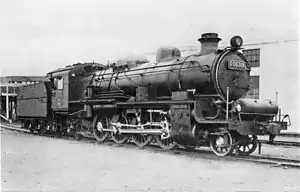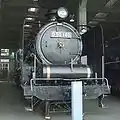JNR Class D50
The Class D50 is a type of 2-8-2 steam locomotive built by the Japanese Government Railways (JGR), the Japanese National Railways (JNR) and various manufacturers from 1923 to 1931. The class name indicates that the locomotive has four sets of driving wheels (D) and belongs to one of the classes of tender locomotive allocated a number in the series 50 to 99 in the Japan Railways locomotive numbering and classification scheme of 1928.
| Japanese National Ry Class D50 China Railways 解放16 class | |||||||||||||||||||||||||||||||||||||||||||||||
|---|---|---|---|---|---|---|---|---|---|---|---|---|---|---|---|---|---|---|---|---|---|---|---|---|---|---|---|---|---|---|---|---|---|---|---|---|---|---|---|---|---|---|---|---|---|---|---|
 D50 319 in 1935 | |||||||||||||||||||||||||||||||||||||||||||||||
| |||||||||||||||||||||||||||||||||||||||||||||||
| |||||||||||||||||||||||||||||||||||||||||||||||
| |||||||||||||||||||||||||||||||||||||||||||||||
| |||||||||||||||||||||||||||||||||||||||||||||||
The design of the D50 was based on the JNR Class 9600 which was introduced in 1916. A total of 380 Class D50 locomotives were built. Between 1951 and 1956 78 were rebuilt to Class D60 2-8-4 Berkshire’s by the JNR .
Service in China
Manchukuo National Railway
In 1923, sixteen D50 class locomotives were exported to the Jichang Jidun Railway in Manchuria, which designated them class 500 and numbered 501 through 516. Ten were built by Kawasaki (works nos. 970−971, 1140−1170) and six by Kisha Seizō (w/n 965−970), and though very similar to the Japanese D50 class, there were some slight differences in dimensions due to the larger loading gauge on Chinese lines. After the establishment of Manchukuo, the Jichang Jidun Railway was nationalised along with other private railways to form the Manchukuo National Railway. The MNR classified these Mikana (ミカナ) class, numbered 6540−6555, renumbered 501−516 in 1938.[1]After the establishment of the People's Republic of China, China Railways designated them ㄇㄎ5 (MK5) class in 1951,[2] and subsequently 解放5 (JF5) class in 1959.
Central China Railway
In 1939, D50 193 was converted to standard gauge and shipped to the Central China Railway, where it operated primarily between Nanjing and Shanghai. This engine lasted in service on China Railways until 1955.[3]
China Railways
After the establishment of the People's Republic of China, all the railways of China were taken over by the China Railway, which classified the D50s as ㄇㄎ16 (MK16) class in 1951,[2] later becoming class 解放16(JF16).
Preserved examples
Two D50s are preserved in Japan.[4]
- D50 25 Park in Kitami, Hokkaido
- D50 140 At the Umekoji Steam Locomotive Museum in Kyoto
 D50 25 in Kitami, Hokkaido
D50 25 in Kitami, Hokkaido D50 140 at Umekoji Steam Locomotive Museum
D50 140 at Umekoji Steam Locomotive Museum
See also
References
| Wikimedia Commons has media related to D50 steam locomotives. |
- 小熊米雄 「満州のD50―吉長、吉敦鉄路の500形について」 交友社『鉄道ファン』 No.22 April 1963, pp.45-47
- 中国铁道部1951年2月版《机车概要表》
- 中国蒸汽機車世紀集影 (Centennial Collection of Chinese Steam Locomotives), China Railway Publishing House, July 2001, ISBN 7-113-04148-5 (in Chinese)
- Sasada, Masahiro (September 2012). 国鉄&JR保存車大全 [JNR & JR Preserved Rolling Stock Complete Guide]. Tokyo, Japan: Ikaros Publications Ltd. p. 133. ISBN 978-4863206175.